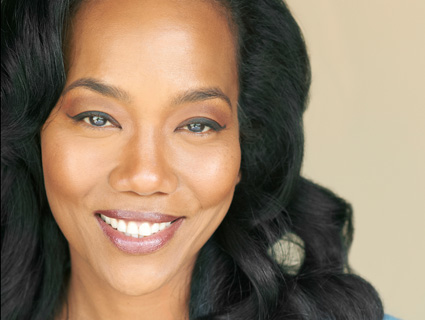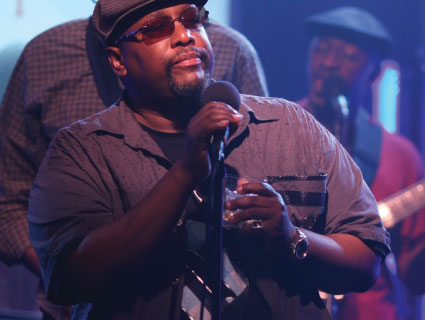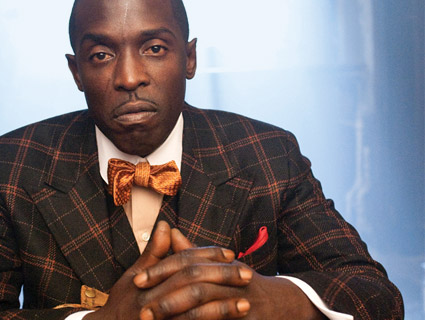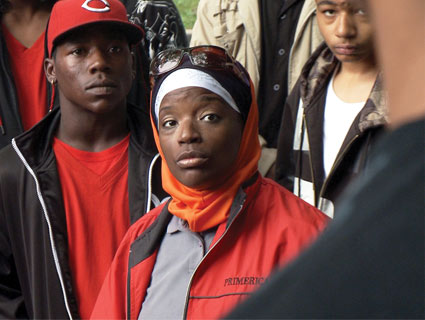
Photo: Suskin Management
Sonja Sohn came up hard. The only female star of the critically acclaimed HBO series The Wire—she portrayed steely detective Kima Greggs—Sohn grew up in a neighborhood as stricken by poverty, drugs, and violence as those depicted on the show. A home life that found her defending her mother against her abusive father (they’ve since reconciled), meant an early life of ambition was dotted with drugs and trouble. It wasn’t until Sohn hit her thirties (already old age for women in Hollywood) that Sohn turned her poetry chops into dramatic ones. Today, Sohn stars in ABC’s Body of Proof and moonlights as the head of ReWired for Change, the Baltimore nonprofit she founded in 2009 to help at-risk youth and youth wrapped up in the criminal justice system break out of the cycle of violence through interventions and workshops (some featuring episodes of The Wire). Coming off a “me trip” to Peru last month—her first such vacation in a decade—Sohn talked with Mother Jones about her past, being a CEO, and, of course, playing Kima.
Mother Jones: Who were the mentors who provided you guidance growing up?
Sonja Sohn: Even though the neighborhood I grew up in had some unhealthy elements, there was a caring there where you knew that you didn’t want to get caught doing something wrong. There were bright spots in the neighborhood where I felt nurtured on a community level. Also, the air that I gave off in school was that I was quite functional. I was making decent grades. I was very academically inclined. But my inner life was in such turmoil. I’d go home and my home life was so miserable that it just felt like I was doing everything that I was supposed to do. I did all my chores, made really good grades, and I was excelling at school, but I wasn’t happy. Making decent grades is easy; if I wanted to get straight A’s I’d have to work a little bit, but I could always pop a B without studying. So I sort of weighted my junior high school and high school years out in that way. And I mean w-e-i-g-h-t-e-d, I weighed myself down, got through.
MJ: What were your hobbies?
SS: When I was little, I was just kind of grabbing at anything I could get my hands on. If there was a hobby it would be reading. But it’s not like I would look through the Encyclopedia Britannica. I loved to write; in my late teens I had a zine. But it wasn’t until I went back to school, later on in my 20s that I actually saw that I had writing talent.
MJ: How did you get into acting?
SS: I went back to school at a point in my life when I did pretty much a 180. I married a really nice artist, a photographer from a middle-class background, two kids, and we lived in Brooklyn and drove a Volvo and rented a five-bedroom house and it was a beautiful picture. But I was basically becoming my worst nightmare, smoking everyday, doing coke on the weekend. My past was catching up with me and the drugs weren’t containing it. It was sort of just popping through this little Norman Rockwell painting left, right, and center ’til I had to address it.
And that’s when I started writing poetry. It was almost as if this poetry was just sort of pouring out of me, and it was addressing all of the pain of my past. It was healing me. On some level, poetry is kind of like a strand of the craft of acting. I studied acting for five years. I quit college at that point. You know, I go hard. When I know I’m supposed to go in a direction, I’m fully committed and I go all the way. Everything falls to the side and I’m all in. So I completely dove into acting even though I was almost 30. I knew what the odds were of success. But I follow spirit over logic all the time and all I knew is this was what was resonating most deeply for me.
MJ: The Wire must have been very emotional for you. How did that affect you on the set?
SS: When The Wire comes along, I’m a bit conflicted: This is my first big long-term gig, but I’m playing a cop. I feel some residual feelings about cops from the way I was brought up and the things that I had experienced with cops growing up. And so now I gotta find a way to be an actress playing a cop as opposed to Sonja thinking she’s a cop. The first year was the hardest, because I thought that I had healed completely from so much of that early childhood trauma that had occurred in my life. I was not expecting the kind of difficulty that I encountered. I was having problems remembering my lines and I would work on them for hours. I couldn’t for the life of me understand why I was experiencing these sporadic freeze-ups. It was absolute torture. I wanted to quit. I was so close to quitting that show. It wasn’t until the beginning of the second season—I just said, “Why don’t you just ease up a little bit, just be professional. Maybe you’re over-investing—maybe you’re caring a little too much.” So I just focused on being technically proficient.
Over the next few years, I began to see what had actually happened. Information started to come to me about how childhood trauma—how trauma in general—operates within people. I began to see that it wasn’t that I couldn’t act—it had nothing to do with my acting talent or ability. What it had to do with was triggers: shooting in a neighborhood that was reminiscent of my old neighborhood. Seeing certain kinds of scenes and people whose lives mirrored the lives of people that I knew. That was triggering all kinds of stuff in my brain that I had absolutely no control over.
MJ: You’ve said that when you were younger, you saw cops as “good for nothing except interrupting the madness of the moment.” Has that perception changed after years of playing a cop on TV—first on The Wire, now on Body of Proof?
SS: There are a number of things that have informed my newfound respect for law enforcement and the people who are in it because they truly want to protect and serve. By playing a police officer and going on ride-alongs and talking to various members of law enforcement, I was able to see that there’s more to the people who do those jobs. And that the cops who are acting without integrity do not represent them all.
MJ: You really had to represent on The Wire. You were the only lesbian and the only woman cop and really the only black woman with a significant role in all five seasons—really the only major female star. Did you feel the weight of upholding all these diverse identities?
SS: I think probably the greatest attraction to the role initially was the fact that those demographics were underrepresented on television. But in terms of having to uphold something, I don’t need any added pressure. I need to be free in the work. It was my job to get to the heart of that character, to get to the truth and the heart of who Kima was—and Kima as a person beyond being black, female, and lesbian. We’re much more than those sort of outward societal tags. I had to honor the full truth of who she was, and in doing that, those demographics would be honored.
MJ: Kima went from ass-kicking clothes as a narcotics officer to dressier digs in homicide. Some people mourned the loss of her shit-kicking outfits. Did you?
SS: Yeah, I liked that! There were pieces of Kima that I really connected to. I liked kick-ass Kima. I liked her in the fatigues and the boots and the hat, and you know, the ch-ch-ch. That was really really fun for me, because you can’t walk around the world being kick-ass. Even in Body of Proof, I think there’s a badass sort of Pam Grier essence in Sam Baker, which I love to play.
MJ: You’ve stayed connected to Baltimore through your nonprofit. What changes have you noticed in the city in the decade since The Wire began?
SS: As much as certain people in Baltimore hated The Wire, I believe that they owe the city’s transformation to The Wire to a great degree. [Cocreator] David [Simon] always made it very clear that Baltimore was the star of the show; it wasn’t the characters, it was the city and the people. I think some things hit a little too close to home for certain folks. The Wire was a mirror to the city. It gave the city an opportunity to take a look at what wasn’t working well and say, “We’ve got to change this.” Even if it’s our vendetta: We’re going to show that we’re better than what was illustrated in that show. We’re better than The Wire. Then the show did its job.
When I was shooting in the low rises, when I was shooting in the West Side, I felt like crap. I’m making a good paycheck and we’re depicting these poor kids who are right beside me where I’m pulling out this fake gun. And when I leave, a guy with a real gun is going to come around the corner, and there are kids running around on the street right here that don’t seem to have all the support that they need. I felt like nobody gave a damn. I felt like I was walking through ghost towns—there was this glistening, gorgeous harbor and all these tourists and this bright, shining Baltimore, and I just felt like, “Oh, wow, the glory’s over here, the sun’s over here, the resources are over here.” And I’m going, “What about all these neighborhoods where I’m shooting? Why don’t I see any sort of transfer of resources into these communities? Why is everything boarded up? “What is going on in this town?” It made me angry.
MJ: Running a nonprofit is its own hustle. How do you juggle your role as CEO of ReWired for Change with your acting career?
SS: Wow, that’s been a huge learning curve. How do I get from this place where we’re operating off of a hope and a dream to an entity that actually has resources to offer folks? It’s hard to get money to support your organization if you have no evidence. It’s very much like the acting business: You need an agent and manager so you can get a job to get resources, but you can’t get an agent and a manager unless people see your work. So basically, I transferred the acting hustle. I said, “Okay, we’ve got to produce something first.”
MJ: Last year, when you testified before a Justice Department task force on children’s exposure to violence, you shared some very personal experiences with the public. What was that like?
SS: On one level, I did that years ago on the poetry stage. But when you make statements like that at a task force hearing, certainly it reaches many more people. I feel that there’s a value in the human experience and sharing that with others. If I didn’t have those experiences growing up, the good ones and the ones that seemed so horrible and awful, I wouldn’t be having an impact. So I’m grateful for the challenge, and even for the pain. I don’t want any other children to have to suffer those kinds of pain, but I also know what builds character and that some of the brightest light tends to come from some of the darkest places.
MJ: HBO, ABC, C-SPAN: Compare and contrast.
SS: HBO has an internal integrity that comes from what seems like a desire to tell the truth. What seems to move that network is truth—rawness, let’s just tell it like it is, whether it’s some man-eating show like The Wire or something lighter, like Curb Your Enthusiasm. HBO has had a grand effect on entertainment television over the last 10 to 15 years. As far as ABC is concerned, I’ve liked working on a network show more than I had anticipated I would. I have not found it stifling, I have not found it cold, I have not found it too Hollywood. But ABC has to answer to its advertisers, and there are certain things they have to acquiesce to. What’s cool about C-SPAN is that it’s no frills. Someone tapes the task force hearing and it just goes up. No one’s trying to manipulate me, no one’s making it entertaining, no one’s trying to manipulate the message. It’s raw and unadulterated, and I have respect for that.














